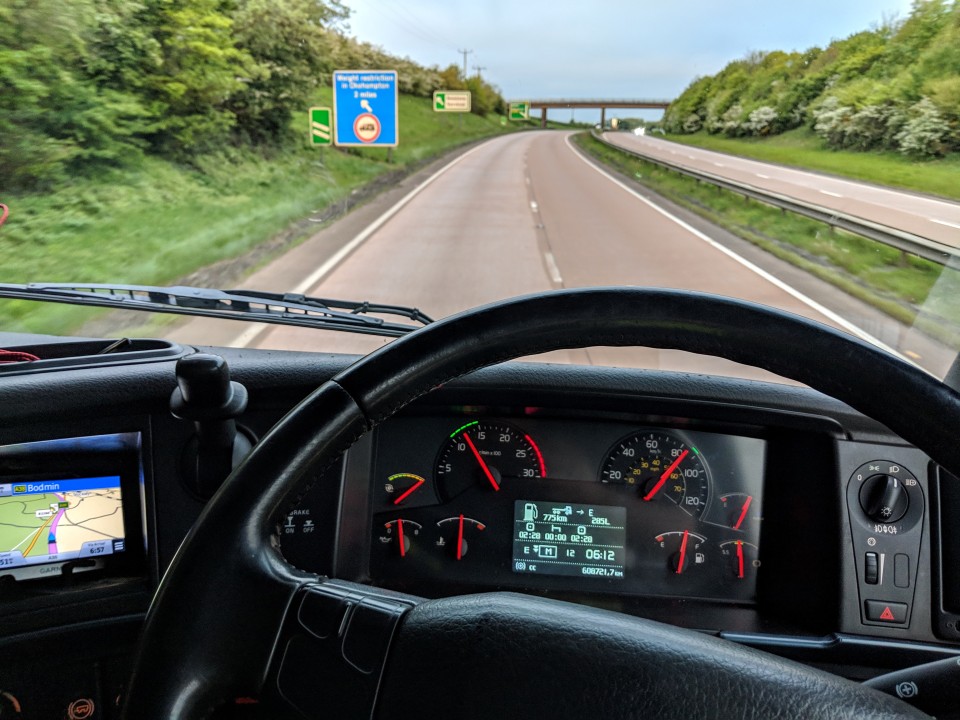
Susie Jones
Wie man ein gesunder Lkw-Fahrer wird
Erstellt: 27.08.2024
•
Aktualisiert: 27.08.2024
Als anspruchsvoller Beruf ist das Lkw-Fahren häufig mit langen Arbeitszeiten, einer sitzenden Lebensweise und einer längeren Abwesenheit von zu Hause verbunden, was sich auf die Gesundheit vieler Fahrer auswirken kann.
Ungesunde Gewohnheiten wie der Verzehr von Fast Food, Bewegungsmangel und ein unruhiger Schlafrhythmus können in der Zukunft zu gesundheitlichen Komplikationen führen. Aber wie bleibt man als Lkw-Fahrer fit? Das ist leichter gesagt als getan, aber wir haben eine Liste mit Tipps zusammengestellt, die Ihnen dabei helfen, während der Fahrt in Bestform zu bleiben.
Sechs Top-Tipps für die Gesundheit im Straßenverkehr
1. Flüssigkeitszufuhr
Ein einfacher Tipp und ein Gut, das wir oft für selbstverständlich halten, aber die meisten Gesundheitsprobleme entstehen durch Dehydrierung. Regelmäßige Schlucke Wasser oder Saft über den Tag verteilt treiben Stoffwechselabfälle und Giftstoffe aus dem Körper und sorgen für mehr Energie und Aufmerksamkeit. Wenn Sie eine wiederauffüllbare Wasserflasche bei sich haben, erinnern Sie sich nicht nur daran, hydriert zu bleiben, sondern tun auch etwas für die Umwelt.
2.Diät
Die Versuchung von Fast Food nach einem langen Tag ist etwas, das wir alle nachvollziehen können. Doch genau wie die ausreichende Flüssigkeitszufuhr spielt auch Ihre Ernährung eine wichtige Rolle für Ihre Gesundheit und dafür, wie Sie sich im Laufe des Tages fühlen werden.
Es wird empfohlen, dass Lkw-Fahrer drei bis vier Mal am Tag essen, entweder zwei Mahlzeiten und zwei Zwischenmahlzeiten oder zwei Mahlzeiten und eine Zwischenmahlzeit. Achten Sie auf einen Speise- und Snackplan, der reich an Omega-3-Fettsäuren, Eisen und Vitamin C ist, z. B. grünes Blattgemüse, Fisch und Obst. Vermeiden Sie den häufigen Verzehr von Nahrungsmitteln und Getränken wie Nudeln, Brot, süßen Getränken und Stimulanzien wie Kaffee und Energydrinks.
Sehen Sie sich unsere Liste mit gesunden Snacks für Ihr Taxi an:
Müsliriegel
Energieriegel
Popcorn
Nüsse
Getrocknete Früchte
Dunkle Schokolade
Neben dem Kauf gesunder Lebensmittel für unterwegs kann es manchmal gesünder und kostengünstiger sein, Mahlzeiten vorzubereiten. Frieghtech hat eine fantastische Auswahl an Rezepten, die Ihnen helfen, sich auch unterwegs gesund zu ernähren.
3.Sleep
Es liegt in der Natur der Sache, dass es für einen Lkw-Fahrer schwierig sein kann, ausreichend Schlaf zu bekommen, was zu verheerenden Folgen für alle Verkehrsteilnehmer führen kann.
Einfache Tipps und Tricks wie die folgenden können Ihnen zu einem erholsamen Schlaf verhelfen:
Schaffen Sie im Fahrerhaus eine Umgebung, in der Sie sich wie zu Hause fühlen. Lesen Sie unseren Beitrag darüber, wie Sie Ihr Lkw-Fahrerhaus zu einem Zuhause machen können
Halten Sie Ihren Schlafbereich dunkel
Eine heiße Dusche: Benutzen Sie unsere maps Seite, um herauszufinden, welche Truckstops diese Möglichkeit bieten
Probieren Sie einige Apps aus, die Sie beim Schlafen unterstützen
Finden Sie den idealen Platz zum Parken mit wenig Lärm und Störungen. Unsere intruck-App bietet Ihnen 5.000 Lkw-Parkplätze in ganz Europa, aus denen Sie auswählen können, während unser [SNAP Access and Security]-Team (https://snapaccessandsecurity.com/) maßgeschneiderte Sicherheitslösungen anbietet, damit Sie in dem Wissen schlafen können, dass Sie und Ihr Lkw sicher sind.
4.Übung
Einer der am schwersten zu befolgenden Tipps, wenn man unterwegs ist, aber dennoch wichtig. Langes Sitzen am Tag kann zu einer schlechten Körperhaltung, Rückenschmerzen und möglichen gesundheitlichen Komplikationen führen. Nach einem langen Tag am Steuer mag es verlockend sein, sich zu setzen und zu entspannen, aber eine kurze 15-minütige Aktivität wie Gehen oder Dehnen kann Sie verjüngen und weniger gestresst machen.
[HMD Trucking] (https://www.hmdtrucking.com/blog/truck-driver-exercises-workout/) bietet einige nützliche Übungen, die auf Lkw-Fahrer zugeschnitten sind, wenn Sie verschiedene Arten von körperlicher Betätigung in Ihre Routine einbauen möchten.
5.Vitamine
Wenn man den ganzen Tag unterwegs ist, kann es schwierig sein, alle notwendigen Vitamine zu bekommen. Die tägliche Einnahme eines Multivitamins kann Ihr Immunsystem stärken und Ihnen helfen, gesund zu bleiben.
6.Psychische Gesundheit
Wir wissen, dass es wichtig ist, sich um die körperliche Gesundheit im Straßenverkehr zu kümmern, aber wie viel Zeit nehmen sich Lkw-Fahrer, um sich um ihre geistige Gesundheit zu kümmern?

Die Wohltätigkeitsorganisation Mind veröffentlichte Statistiken, aus denen hervorgeht, dass 30 % der selbstberichteten arbeitsbedingten Erkrankungen in der Transport- und Logistikbranche auf Angst, Einsamkeit, Stress und Depressionen zurückzuführen sind. Sie deuteten auch an, dass diese Zahl noch höher sein könnte, da die meisten Menschen nicht die Hilfe suchen, die sie benötigen. Hinzu kommt, dass 95 % der Menschen, die sich krankschreiben lassen, nicht den wahren Grund für ihre Abwesenheit von der Arbeit angeben, wenn es um ihre psychische Gesundheit geht.
Wenn Sie die oben genannten Tipps und Tricks befolgen, kann sich dies positiv auf Ihre psychische Gesundheit auswirken. Außerdem ist es wichtig, offene und ehrliche Gespräche mit anderen Lkw-Fahrern, Vorgesetzten oder Disponenten zu führen.
Können Sie durch Bewegung ein besserer Autofahrer werden?
Ein gesunder Lebensstil führt nicht nur zu einer besseren geistigen Gesundheit, sondern es gibt auch Hinweise darauf, dass er Sie zu einem besseren Autofahrer machen kann. Eine Studie zeigte, dass Autofahrer, die aufgefordert wurden, täglich Sport zu treiben, ihren Kopf leichter drehen, ihren Körper weiter drehen und schneller in ihr Auto einsteigen konnten.
Was ist das Schwierigste am Beruf des Lkw-Fahrers?
Lange Arbeitszeiten scheinen einer der schwierigsten Aspekte des Lkw-Fahrens zu sein. Lkw-Fahrer müssen oft viele Kilometer zurücklegen und haben unsoziale Arbeitszeiten. Diese langen Kilometer und unsozialen Arbeitszeiten können zu einem ungesunden Lebensstil führen.

Wie ungesund ist der Beruf des Lkw-Fahrers?
Aufgrund des Lebensstils vieler Lkw-Fahrer ist die Wahrscheinlichkeit, dass sie gesundheitliche Probleme haben, statistisch gesehen höher als bei Menschen in anderen Berufen. Lkw-Fahrer sind oft mit einigen Hindernissen konfrontiert, wie z. B. engen Arbeitsräumen, stressigen Situationen, ungewöhnlichen Schlafgewohnheiten und einem Mangel an nahrhafter Nahrung, die sich alle auf ihre Gesundheit auswirken.
Die Aufrechterhaltung eines gesunden Lebensstils als Lkw-Fahrer erfordert eine bewusste Anstrengung, aber die Vorteile, die sich daraus ergeben, sind es allemal wert. Mit den oben genannten Tipps können Sie Ihre Gesundheit selbst in die Hand nehmen und Ihr Wohlbefinden verbessern. Halten Sie Ausschau nach weiteren Tipps und Tricks von SNAP.



